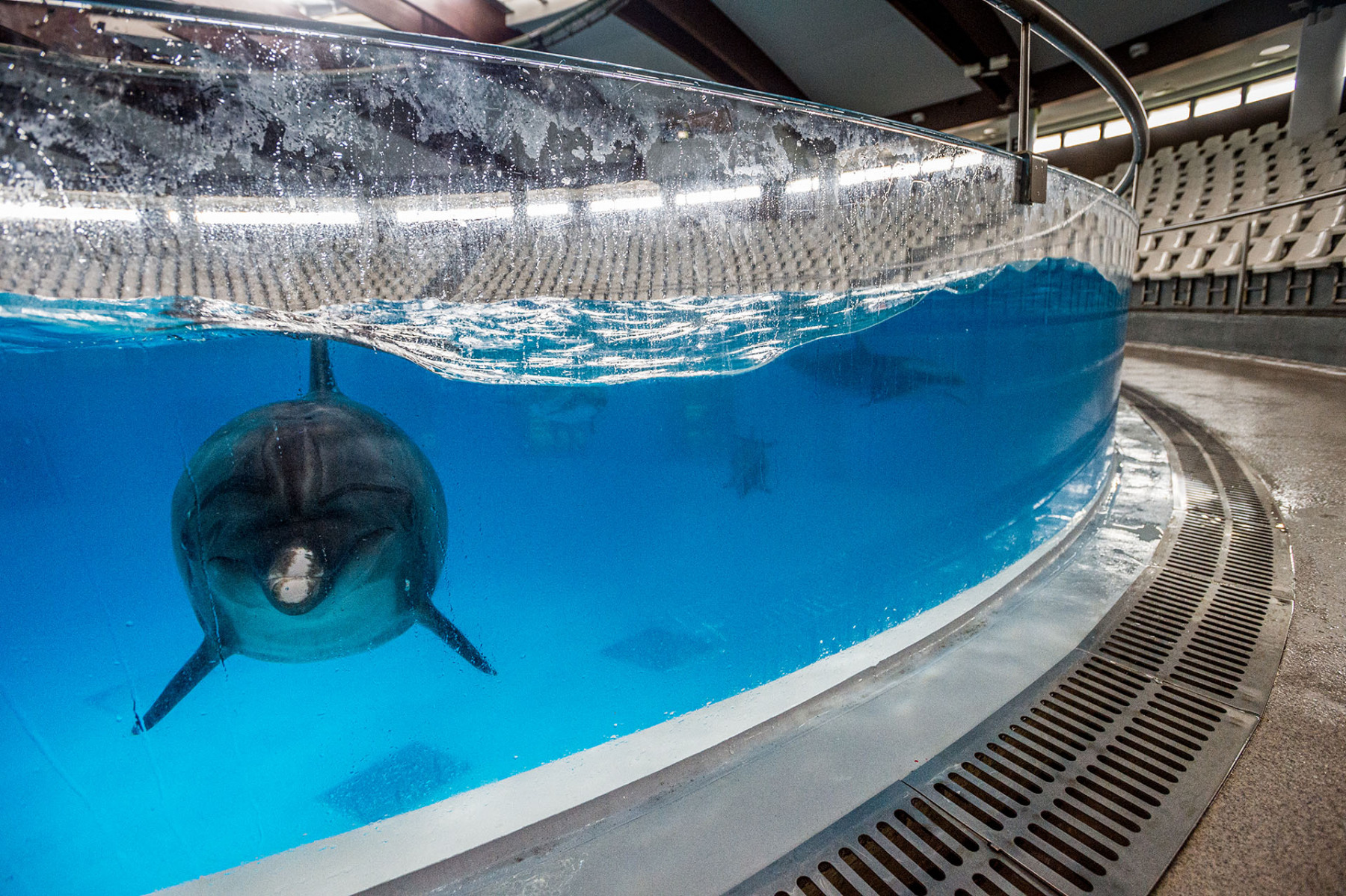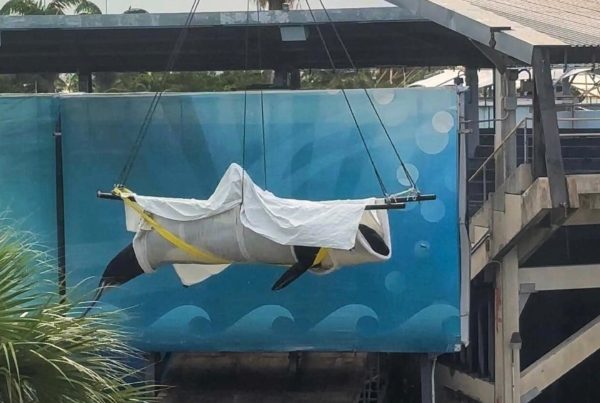
Pressure mounts for TUI to stop promoting captive dolphin attractions – including those captured from the wild during ‘cruel’ hunts in Japan.
By Claudia Tanner
Dolphin Freedom UK says many of the animals in tanks are captured from the wild and ripped away from their families.
A group of animal rights campaigners is making a renewed call for travel group TUI to stop selling attractions and experiences involving captive dolphins and whales.
Chris Kempen, from Dolphin Freedom UK, says the “dark side” of captivity – where the animals suffer chronic stress, illness, a compromised immune system and premature death – should not continue to be ignored “for the sake of entertainment and profit-making”.
TUI is the only main tour operator are still selling trips to SeaWorld and similar venues and the group is calling on the company to follow other major holiday firms, including Virgin Holidays, British Airways, STA Travel, Booking.com, TripAdvisor and Airbnb, in axing them.
“TUI has gone under the radar and we want to see them get with the times,” said Chris. “The public mood has changed as people are more aware of the cruelty of captive dolphins and other wild animals.
“Dolphins are intelligent creatures who in the wild can swim up to 80 miles a day. They and thousands of other types of wild marine animals such as whales and sea lions shouldn’t be in cramped tanks suffering stress and boredom.”
Dolphin Freedom UK also claims TUI is selling tickets to parks which are buying dolphins and whales captured from the wild, including a hotel which sources mammals from the highly controversial drive hunts in Japan, Cuba and Russia branded as ‘cruel’.
In a letter to the company, the group wrote: “On top of this, many of the animals confined in these tanks are often captured from the wild and ripped away from their families, often causing devastation and extreme trauma to captured animals and their family members.”
Chris has started a Change.org petition about the issue which has been signed by almost 4,500 people. Nearly 95,000 PETA members and supporters – including Sharon Osbourne and Andy Murray – have contacted the travel provider, demanding that TUI drop marine parks from its itineraries.
However, TUI told the i it has an audit programme in place to ensure that the venues it markets are upholding “global animal welfare standards”.
Last November, a 10-year-old British girl, Lexi Yeo, was terrified and left with bite marks, cuts and bruises after she was dragged underwater by two dolphins during a swim-with-dolphins experience in Mexico booked through TUI.
In 2012, a dolphin at SeaWorld, Orlando, attacked another young girl, eight-year-old Jillian Thomas, during feeding time, biting into her arm and almost dragging her into the water.
PETA says that putting dolphins in stressful situations where they are forced to perform and interact with humans can lead to aggressive behaviour. Director Elisa Allen said: “PETA has provided the company with ample information showing that confining intelligent, social dolphins to cramped, concrete tanks are physically and psychologically destructive, leading them to attack each other and others who enter their pitiful enclosures.”
Dolphin Freedom UK has criticised TUI for offering rooms in a Chinese hotel featuring on-site attractions that have captive dolphins sourced from a ‘drive fishing’ hunt in Japan. It is calling on the firm to cut its ties with the Atlantis Sanya in Hainan province, which is not listed on its UK site but on its German site
According to MailOnline, China does not have a captive breeding program and virtually all the whales and dolphins in captivity come from the wild. Dolphin Freedom says the hotel has 10 dolphins captured along with all the others in China from the notorious driving hunt in Taiji, the only place in the world that is regularly making wild-caught animals available for international trade.
Ceta-Base, which claims to be the most extensive global record of marine mammals in captivity, shows six dolphins at Sanya were captured from Taiji.
During the controversial annual six-month hunting season there, as featured in the Oscar-winning 2009 documentary The Cove, hundreds of the mammals are driven into a secluded bay and butchered for their meat – turning the water crimson red – and sold on to dolphinariums.
Dr Naomi Rose, a marine mammal scientist for the Animal Welfare Institute, told the Mail the capture techniques in the drive fishery are “wildly inhumane and cruel”. She said: ‘The dolphins are stampeded by a wall of sound – highly traumatic for these acoustically oriented animals – driven into a cove, and then most of the dolphins are slaughtered, with a few set aside for live trade. The ones set aside can see and hear the slaughter of their pods – these individuals can reasonably be assumed to suffer from post-traumatic stress disorder.”
TUI did not offer any comment about the driving hunt claims. A spokesperson said: “TUI Group is aware of the petition and we understand the debate surrounding animals in captivity. TUI is committed to working only with excursion venues that agree to uphold the Global Welfare Guidance for Animals in Tourism as formulated by the Association of British Travel Agents (ABTA).
“Venues offered by TUI are subject to an extensive and independent animal welfare audit programme to ensure that they are upholding global animal welfare standards. We are in ongoing discussions venues to elaborate ways to further improve animal welfare and address the issues of concern.”
However, Dolphin Freedom UK’s position is that the guidelines “offer little protection for the animals being held captive and have been well structured to suit the interests of the marine animal captivity industry”.
Atlantis Sanya has not responded to a request for comment. The company that runs the hotel, Kerzner, was reported by the Mail to have said the way the dolphins were captured “does not meet our high standards”.
SeaWorld faced public backlash after the acclaimed documentary Blackfish was released in 2012 which told the story of Tilikum, a performing killer whale at Seaworld that killed several people while in captivity. The film argued that SeaWorld Orlando’s treatment of killer whales was both physically and psychologically harmful to the animals, causing violent and neurotic behaviours.
Since the release of Blackfish, other SeaWorld trainers claim killer wales were starved, drugged up and stressed so much they self-harmed and died young.
The controversy lead to a drop in the company’s profits, however, sales began to recover in 2018 with the addition of new attractions at its parks, as well as increased marketing about the parks’ conservation and rescue efforts.
SeaWorld Orlando revealed they will begin 2020 by changing their centrepiece killer-whale show to a new ‘educational’ program.
However, groups like PETA say the conservation efforts are not enough and have pushed for the Seaworld to relocate their animals to coastal sanctuaries. Wild orcas live in the wild for between 50 to 80 years. According to National Geographic, only a handful of wild-caught captive orcas have lived past age 30 and no captive-born orca has.
PETA says 41 orcas and numerous other animals have died on SeaWorld’s watch – far short of their natural life expectancies.
Header image by We Animals Media



